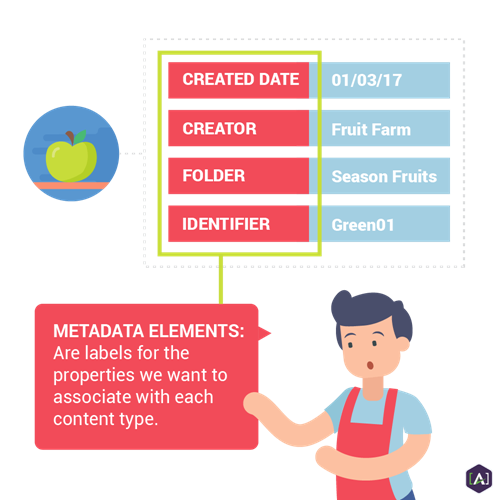Are you looking to create compelling content that stands out in today's digital landscape? It’s time to leverage key helpers that make information discoverable and usable for both users and Gen AI: website and content metadata.
Recent research shows that effective metadata strategies can lead to reduced training times for AI algorithms and more focused identification of meaningful patterns - spotlighting metadata's invaluable role in data management.
However, many organizations need help to realize metadata's full potential. According to IBM's Cost of a Data Breach Report 2023, 83% of companies have experienced data quality issues from inaccurate or missing metadata. Poor metadata practices can have significant business impacts - the typical company loses 10-20% of its income due to data quality problems. This highlights the urgent need for metadata frameworks to fully capitalize on data's value.
Let's see how content and website metadata function together to power businesses and digital experiences!
Website Metadata: The High-Level Plan
Website metadata provides a high-level blueprint outlining how different sections and pages across our fruit website are connected.
For example, having website metadata that enables a section label or tag makes it easy for users to locate related content. Website metadata maps out the relationships binding a website's content together through a structured taxonomy. This architecture enables intuitive navigation so users can easily find the information they seek.
Content Metadata: The Storyteller
While website metadata provides the structure, content metadata focuses on filling in the specifics - the compelling stories. Content metadata includes elements like titles, descriptions, subjects, and keywords. If website metadata supplies the framework, content metadata colors it in.
The website metadata offers the architecture, while the content metadata tells the story of that specific information.
In short, content metadata spotlights the nuances. Planning metadata organization upfront with supportive tools like SchemaFlow can enrich content. SchemaFlow leverages Schema.org to provide content type templates, simplifying metadata planning and setup. This enables creators to enrich content with standardized details tailored to their business.
Integrating Schema Markup with SchemaFlow
Using Schema Markup in metadata strategy is important for better search engine visibility and engagement.
SchemaFlow makes integrating Schema Markup straightforward. By adhering to the standards set by Schema.org, it ensures that your metadata is structured in a way that is both comprehensible and beneficial to search engines. This structured format not only aids in better indexing of your site but also enhances the direct accessibility of your content to users through more detailed and visually appealing search results.
Metadata Propels Content Everywhere
Beyond architecture and details, metadata grants content fluidity across platforms. It allows discoverability on search engines and adaptability across devices and mediums. Metadata unlocks content's potential, enabling it to flow seamlessly to users however it needs to arrive.
Laying the groundwork is pivotal in unleashing the full power of website and content metadata. Properly configuring these elements streamlines content creation and positions content to thrive across platforms. Let's explore critical aspects of metadata setup using our seasonal fruits example.
1. Website Taxonomy: The Bedrock for Metadata 
Before content development, establish a clear website taxonomy - the bedrock providing structure. A well-defined taxonomy lays the groundwork for effective website metadata by logically categorizing information.
For example using a fruit website, the taxonomy could contain main categories like "Seasonal Fruits," "Tropical Fruits," "Citrus Fruits," etc. Under "Seasonal Fruits," we might have subcategories for summer, fall, winter, and spring produce. The "Summer Fruits" subcategory could include pages detailing strawberries, cherries, peaches, and more. This explicit categorization benefits users by enabling intuitive navigation to find desired produce. It also guides content creators on where to place new fruit pages logically.
2. CMS Selection: Simplifying Metadata Configuration
The choice of a content management system (CMS) impacts the ease of metadata configuration. Opting for a CMS with intuitive metadata tools ensures seamless, efficient processes.
Envision a user-friendly CMS interface enabling effortless metadata input - details like titles, descriptions, and categories. This simplicity saves content creators' time while maintaining consistent information presentation.
We'd want a user-friendly CMS interface that enables effortless metadata input for fruit varieties - details like titles, descriptions, and categories. This simplicity saves content creators' time while maintaining consistent information architecture and presentation across the site.
Choosing the right CMS is important for simplified metadata management. For best practices and guidance, download our free guide that provides actionable tips on evaluating CMS platforms and ensuring your choice aligns with strategic goals.
3. Tagging Content for Discoverability
In addition to taxonomy categories and other metadata fields, tagging is another strategy for optimizing content discoverability and usability.
Tags provide additional keywords and descriptive terms applied directly to content items. For our fruit website example, we could tag specific apple variety pages with terms like "sweet," "tart," "winter harvest," etc. Tags enable searching and filtering of content, allowing users to easily find apples based on desired characteristics.
From the creator's side, thoughtful tagging requires upfront planning to identify meaningful terms that resonate with users. However, when done well, it significantly enhances the findability of content. Tags also aid recommendations and personalization based on user interests.
For example, someone searching for "tart apples" on our site would quickly get suggested results thanks to descriptive tagging. Tags bridge metadata architecture with user search patterns, making content connectivity more intuitive.
Crafting Content for Diverse Audiences
Engaging different audiences effectively is key. Success lies in strategically using metadata - the little details that help optimize content for different user groups.
| Type of Metadata | Objective | Example |
|---|---|---|
| Descriptive | Identify and describe a digital resource | Title, author, subject, keywords, abstract |
| Administrative | Manage and preserve a digital resource | File format, creation date,copyright information |
| Structural | Describe the internal structure of a digital resource | Order of pages in a book, relationships between different parts of a website |
Metadata: Fueling AI and Data Governance
Metadata plays a behind-the-scenes role in both AI development and effective data governance programs.
On the AI side, metadata provides context about relationships within data that helps algorithms accurately identify meaningful patterns and insights. Tags guide AI on the meaning of data points and how they connect.
For data governance, metadata gives visibility into how information gets generated, processed, used, and transformed across its lifecycle. These insights enable tracking data trails end-to-end to ensure compliance with regulations and ethical data usage. Metadata details on sources, changes made, access controls, and intended applications guide decisions on appropriate data handling.
So, comprehensive metadata strategies empower organizations to innovate with AI safely and manage data. Metadata provides a roadmap for algorithms to deliver fair, accurate outcomes aligned with user expectations. And it equips data governance programs to support strong privacy and security standards.
Unlock Your Content's Potential With Metadata
Proper metadata setup provides the foundation for discoverable, adaptable content and streamlined digital experiences. However, designing an optimal metadata framework requires specialized expertise.
[A] guides clients through each stage of metadata planning and implementation. Whether building metadata architecture from scratch or refining existing frameworks, [A] 's tailored solutions empower organizations to craft metadata that unlocks content possibilities.
With [A] as your partner, expect actionable advice on elements like:
- Constructing intuitive website taxonomy
- Selecting metadata-friendly CMS platforms
- Configuring metadata for enhanced display across devices
- Crafting targeted metadata for diverse audiences
Partner with the experts at [A] for best-in-class guidance on implementing metadata practices to propel your content everywhere.
.png.aspx)




